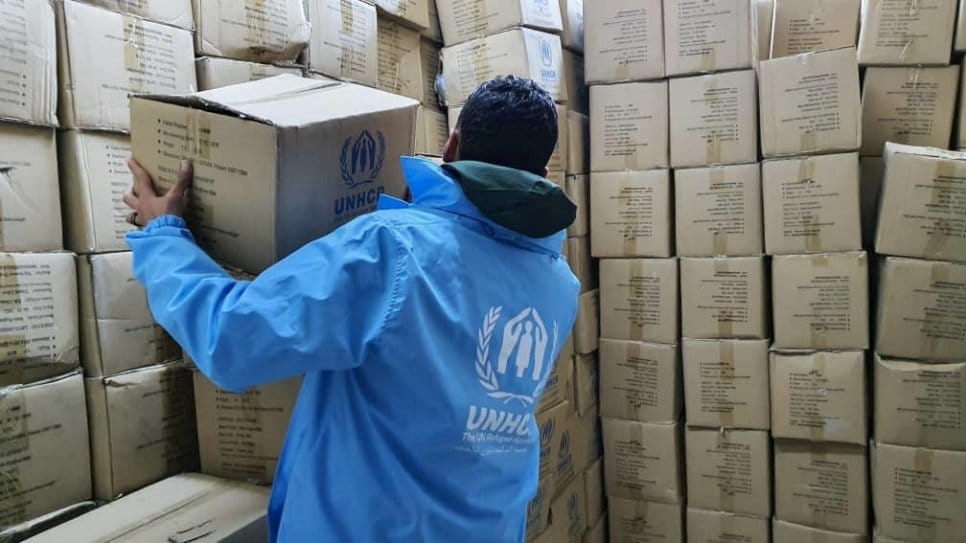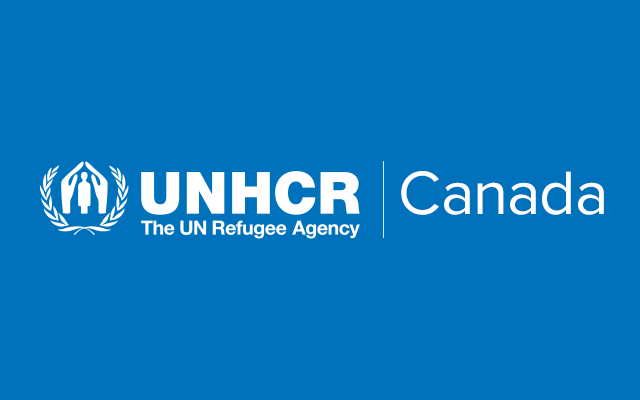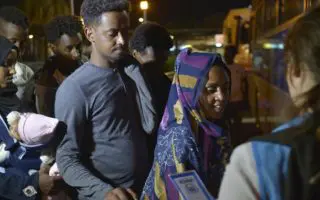
A UNHCR staff member prepares relief items for distribution to vulnerable displaced people in Libya, February 2020. © UNHCR/Walid Ben Rahouma
This is a summary of what was said by UNHCR spokesperson Babar Baloch – to whom quoted text may be attributed – at today’s press briefing at the Palais des Nations in Geneva.
One year since the launch of a military offensive in Tripoli, Libya, fighting is further worsening with COVID-19 now bringing new threats, warns UNHCR, the UN Refugee Agency.
More than 300 civilians have been killed and 150,000 others displaced from their homes since last April. Despite the tentative agreement on a humanitarian truce, fighting escalated significantly in the past week. The deteriorating security has also undermined the ability of the tens of thousands of formerly displaced persons to safely return to their areas of origin.
Meanwhile, the authorities have now confirmed ten cases of COVID-19 and one death in Libya, raising new fears about the ability of the country’s weakened health services to respond.
The ongoing conflict has severely impacted the country’s health system and medical services, which have limited financial resources and face shortages of basic equipment and medicines. Many hospitals or health facilities, located in areas close to the conflict, have also been damaged or closed.
UNHCR and partners are providing generators, ambulances, prefab-containers and tented clinics, in support of local health-care services. We are also raising public health awareness amongst refugees, asylum-seekers and Libyans, through posters, text messages and social media, aimed at mitigating the risks of exposure to COVID-19.
Together with other humanitarian agencies, UNHCR is calling on the Libyan authorities to ensure the access and inclusion of all population groups in Libya to health surveillance, preparedness, response plans and activities.
With other agencies, we are also repeating our calls for the orderly release of those held in detention to the community. Asylum-seekers and refugees, held in detention because they do not have legal documentation, are particularly vulnerable and exposed, given often poor sanitation facilities, limited health services and overcrowded conditions. Many detention centres are also located in areas close to fighting frontlines.
Daily life is becoming increasingly difficult for people across conflict-torn Libya. Libyan civilians as well as refugees and asylum-seekers face tough challenges in accessing basic goods and services or finding work. Rental, food and fuel prices have spiked and people are facing serious difficulties accessing their basic needs.
UNHCR is particularly concerned at the growing lack of affordable housing and the rise in rental prices, as more displaced or secondarily displaced Libyans have been forced to leave their homes and are seeking new places to rent.
This has particularly impacted refugees and asylum-seekers who are unable to find regular work. Refugees have told UNHCR that rental prices for single room accommodation has gone up as much as six-fold, while rental costs for houses had trebled. Many people are living in crowded, unfinished and unfurnished buildings or garage units, with as many as ten people sharing a single room.
The volatile security has also led to a spike in criminality, with increased cases of targeted robberies and attacks.
UNHCR continues to operate in Libya to help provide protection and assistance to refugees, asylum-seekers, forcibly displaced Libyans and returnees, but the delivery of assistance has been severely hampered by strict security movement protocols and reduced presence on the ground.
In the last 12 months, UNHCR has provided medical consultations for more than 25,500 people, distributed emergency relief items to more than 42,700 people, and cash assistance to nearly 2,500 people. UNHCR has also supported 37 projects aimed at fostering peaceful co-existence between refugees, displaced Libyans, returnees and host communities, including through the rehabilitation of social infrastructure such as health and education facilities.
UNHCR echoes the appeal of UN Secretary-General António Guterres urging warring parties across the world to cease their fighting in support of the response to the threat of the COVID-19 pandemic.
For more information on this topic, please contact:
- In Tripoli, Tarik Argaz, argaz@unhcr.org, +216 299 612 95 or +218 91 002 1607
- In Tunis, Caroline Gluck, gluck@unhcr.org, +216 299 255 06
- In Geneva, Charlie Yaxley, yaxley@unhcr.org, +41 795 808 702
Originally published by UNHCR on 03 April 2020




